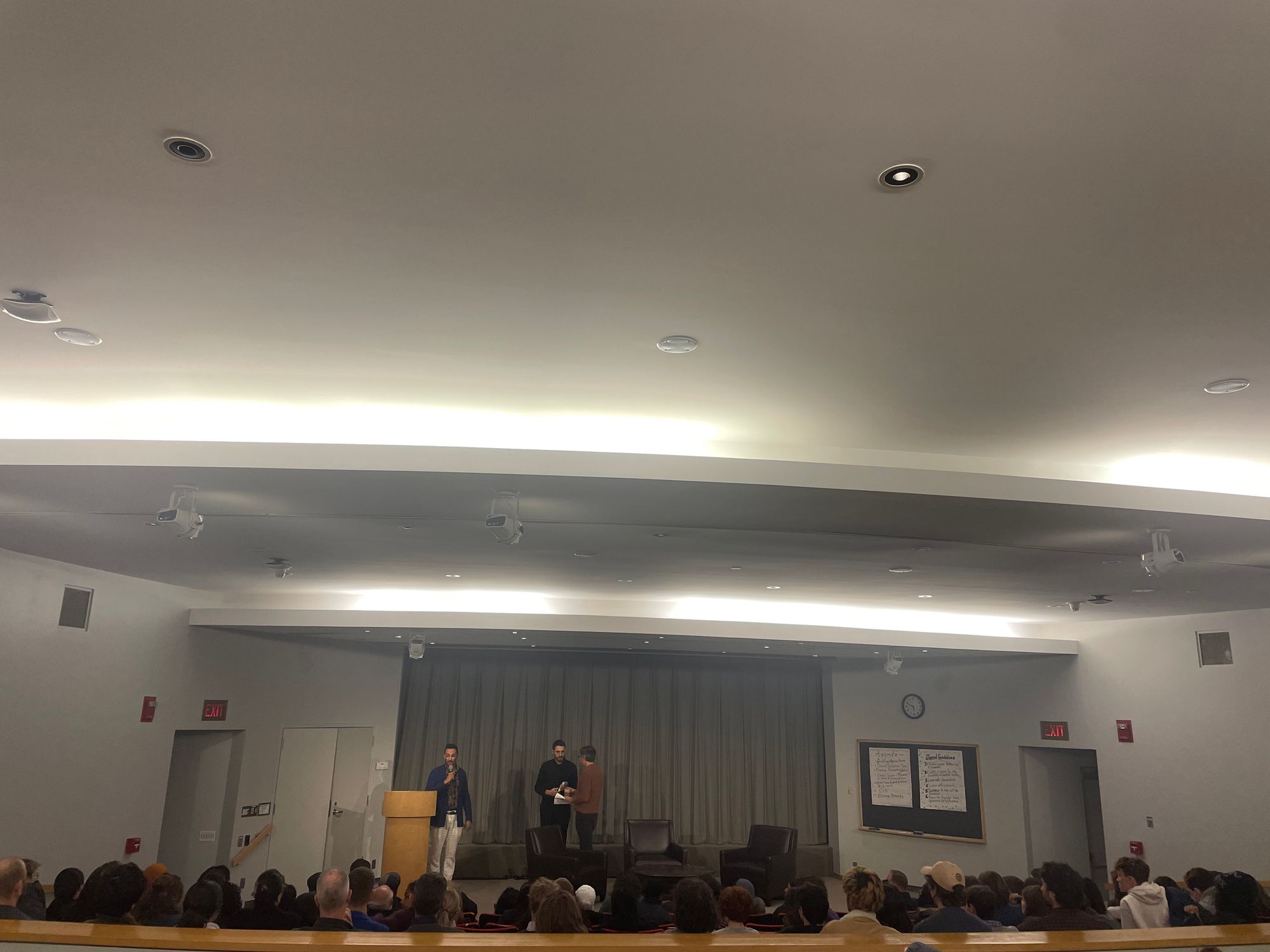Palestinian Journalist Speaks on Israeli Occupation, Zionism

Palestinian poet, journalist, and organizer Mohammed El-Kurd spoke in a discussion moderated by podcast host and writer Daniel Denvir on Tuesday Nov. 14 in Stirn Auditorium. The event, titled “Against Occupation,” was the final event of the Freedom Talks speaker series.
El-Kurd’s remarks sought to center the historical and political embeddedness of the violence in Israel-Palestine, explaining that the Oct. 7 attack by Hamas was the result of a long history of Israeli aggression. He repeatedly emphasized that these circumstances are not merely contextual and marginal, but essential to understanding of the current situation.
The event began with a presentation of community agreements from Suzanne Belleci, director of the center for restorative practices.
Belleci highlighted that attendees may be asked “to step out of this space and enter another venue” if they became upset to the point that “this becomes a space for you where Mr. Mohammed El-Kurd can’t finish his thoughts.”
Jared Loggins, professor of political science and Black studies, then gave opening remarks before the speakers took the stage.
Despite the decades-long status quo of Israeli settler violence against Palestinians, the events of Oct. 7 have been a turning point in the media attention that the struggle between Israel and Palestine have received, Denvir said.
El-Kurd explained that this shift is because the Oct. 7 attacks resulted in large numbers of Israeli casualties, which international onlookers value above Palestinian lives lost that are regarded as “business as usual.”
“I think we learned time and time again that history begins at their loss,” El-Kurd said. “And I'm not talking about just Israelis, I'm talking about Europeans and Israelis and superpowers.”
On top of this double standard, however, Palestinians both at home and abroad are forced to defend their resistance and sanitize their language, El-Kurd said.
“We have to defend ourselves while the bombs fall on our people,” he said.
El-Kurd spoke about the discrepancy between Israel’s stated goal of “eradicating Hamas,” despite the fact that it is not in the state’s political interest to do so and that Israel has chosen to keep Hamas in power in the past.
By Israeli estimates, fewer than 100 members of Hamas have been killed in the bombardments since Oct. 7, out of 11,000 total Palestinians, El-Kurd said.
The violence being inflicted upon the people of Gaza combined with the international community’s trend of criminalizing and penalizing Palestinian non-violent activism will only beget more violent resistance, perpetuating the cycle that created Hamas to begin with, El-Kurd said.
Denvir and El-Kurd also discussed the shift in the legitimacy of the Zionist movement following Oct. 7.
El-Kurd explained that he is not opposed to the notion of a Jewish homeland, just that he has a problem with it being in his backyard.
“And I say in my backyard, not as an exaggeration, but as a fact,” El-Kurd said. “There is literally a settler from Long Island, who is of European descent, who emigrated to Israel, got Israeli citizenship, and then squatted in my house, claiming it’s his own by divine decree, and under the protection of the Israeli army and judiciary.”
He described Zionism as an “exclusive, exclusionary, expansionist ideology,” the goal of which is to “have as much land as possible with as few Palestinians as possible left on it.”
Denvir transitioned to consider the role the Palestinian struggle has played in revitalizing the international political left.
El-Kurd explained that the plight of the Palestinians has gained so much traction in this regard because it is a “concentrated illustration of the way Western superpowers exert violence on indigenous people.”
He highlighted that the same tactics that are used to criminalize peaceful Palestinian resistance, like the boycott, divestment, and sanction movement, are used against climate activists and that American police forces are often trained by Israeli troops.
This creates the opportunity for solidarity across movements, he said.
“Israel and the superpowers of the world have mutual interests,” El-Kurd said. “Our oppressors are one and the same, and we can work together.”
During a question and answer session, El-Kurd explained his vision for a free Palestine: it must include the release of political prisoners, allowing Palestinian refugees abroad to return home, the return of stolen land, and the redistribution of economic resources.
“It’s very achievable,” he said. “I refuse to live in a reality in which the subjugation and the statelessness of millions and millions of people can just be business as usual.”
In response to another question, El-Kurd addressed concerns about penalization for pro-Palestiniain activism.
“There is legitimate fear over people’s academic prospects as well as career prospects,” El-Kurd said. “But I want to remind all of us in this room that these fears can never compare to the consequences of living under occupation. Being socially ostracized, or losing your job is never going to compare to losing your home or losing your entire family … so I want to encourage everybody to be brave.”
Caelen McQuilkin ’24E was inspired by this sentiment.
“The status quo isn’t the only reality,” she said. “We can fight to live in a world that looks different than this one right now.”
Fiona Yohannes ’25 was also encouraged by the audience turnout at the talk. “It was really interesting to see a really diverse group of people here with diverse ideologies. It was really evident in the questions being asked, which is really great,” she said.